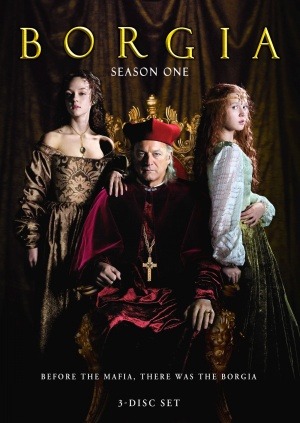
Borgia is a miniseries just like The Tudors. (There is also a miniseries on Showtime titled ‘The Borgias.’) When my friend suggested it, I didn’t even know who the Borgias were, so I did a little research. Rodrigo Borgia, also known as Pope Alexander VI, is the center of the miniseries.
Spanish and Italian, he is one of the most prominent bishops when the current pope dies and a new one has to be chosen. Through wheeling and dealing and using his four children as advantageous pawns, Rodrigo becomes the next pope. And yes, you read that correctly: Rodrigo has four children, plus a fifth on the way. But he was a bishop!, you say. Yes, he was, and continued to have a mistress and more children while he was pope.
Borgia begins with Rodrigo’s deals with the other bishops to ensure their vote for his nomination as pope. We also meet his mistress, four children, and his ex-mistress, the mother of his four children. His children all believe Rodrigo is their uncle, not their father, and in this way support him in his quest for pope. But no one truly knows what goes on between the bishops except for the bishops themselves.
Rodrigo promises one bishop the highest position after himself in exchange for a vote, his daughter in marriage to one of the bishop’s cousins for another, and so on and so on. Pursuing this course of action, he has naturally made enemies, and must defeat them in order to become pope.
He achieves his goal of becoming pope and immediately breaks all or most of his promises that he made to the other bishops, enraging them all. His first act as pope is to legalize his children and give the two oldest sons positions of power.
When I began watching this series, I expected there to be politics and issues like that involved–it is the Catholic church, after all. But the amount of promises and deal-breaking involved is disgusting. Not to mention the absolute wealth of all of the bishops and the pope, while the majority of Italians live in poverty.
After feeling bad about all of this, then one must observe his children being used as pawns: all of them are used to their father’s advantage, but especially his daughter, Letizia. Young, unbroken and naive, Letizia does not really know what she wants out of her life, and Rodrigo uses this to his advantage. First promising her in marriage to one man and then another, Letizia decides she wants to enter a convent. Finally she is married, against her will, and Rodrigo will not let her consummate her marriage, in an attempt to preserve her virginity in case she needs to be divorced and married to someone else.
The hypocrisy of the church’s actions cannot be overlooked–while preaching help and love for all followers, the church’s highest members actually take all of the wealth for themselves and themselves only, sometimes even discarding their own family members in their struggle for power. How can one even take the church seriously after watching this? Yes, it was in the 1500s, but one only has to think about the priests now (paid, full-time positions with housekeepers, cooks and no bills) to realize that this kind of hypocrisy is ongoing, and not stopping anytime soon.